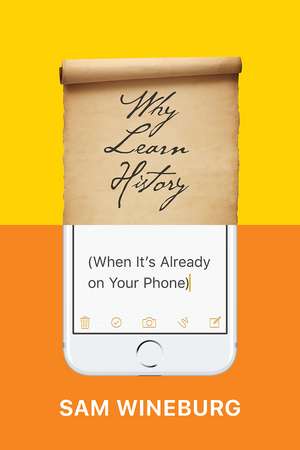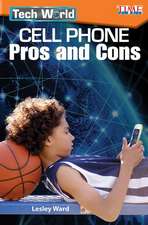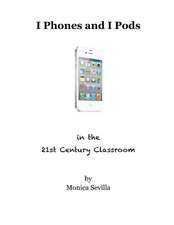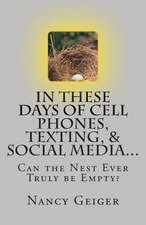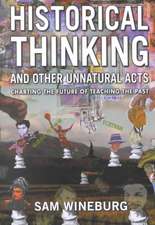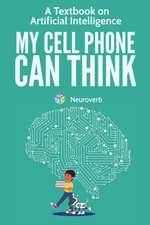Why Learn History (When It's Already on Your Phone)
Autor Sam Wineburgen Limba Engleză Paperback – 25 sep 2018
Let’s start with two truths about our era that are so inescapable as to have become clichés: We are surrounded by more readily available information than ever before. And a huge percentage of it is inaccurate. Some of the bad info is well-meaning but ignorant. Some of it is deliberately deceptive. All of it is pernicious.
With the internet always at our fingertips, what’s a teacher of history to do? Sam Wineburg has answers, beginning with this: We definitely can’t stick to the same old read-the-chapter-answer-the-questions-at-the-back snoozefest we’ve subjected students to for decades. If we want to educate citizens who can sift through the mass of information around them and separate fact from fake, we have to explicitly work to give them the necessary critical thinking tools. Historical thinking, Wineburg shows us in Why Learn History (When It’s Already on Your Phone), has nothing to do with test prep–style ability to memorize facts. Instead, it’s an orientation to the world that we can cultivate, one that encourages reasoned skepticism, discourages haste, and counters our tendency to confirm our biases. Wineburg draws on surprising discoveries from an array of research and experiments—including surveys of students, recent attempts to update history curricula, and analyses of how historians, students, and even fact checkers approach online sources—to paint a picture of a dangerously mine-filled landscape, but one that, with care, attention, and awareness, we can all learn to navigate.
It’s easy to look around at the public consequences of historical ignorance and despair. Wineburg is here to tell us it doesn’t have to be that way. The future of the past may rest on our screens. But its fate rests in our hands.
With the internet always at our fingertips, what’s a teacher of history to do? Sam Wineburg has answers, beginning with this: We definitely can’t stick to the same old read-the-chapter-answer-the-questions-at-the-back snoozefest we’ve subjected students to for decades. If we want to educate citizens who can sift through the mass of information around them and separate fact from fake, we have to explicitly work to give them the necessary critical thinking tools. Historical thinking, Wineburg shows us in Why Learn History (When It’s Already on Your Phone), has nothing to do with test prep–style ability to memorize facts. Instead, it’s an orientation to the world that we can cultivate, one that encourages reasoned skepticism, discourages haste, and counters our tendency to confirm our biases. Wineburg draws on surprising discoveries from an array of research and experiments—including surveys of students, recent attempts to update history curricula, and analyses of how historians, students, and even fact checkers approach online sources—to paint a picture of a dangerously mine-filled landscape, but one that, with care, attention, and awareness, we can all learn to navigate.
It’s easy to look around at the public consequences of historical ignorance and despair. Wineburg is here to tell us it doesn’t have to be that way. The future of the past may rest on our screens. But its fate rests in our hands.
Preț: 147.16 lei
Nou
Puncte Express: 221
Preț estimativ în valută:
28.16€ • 29.29$ • 23.25£
28.16€ • 29.29$ • 23.25£
Carte disponibilă
Livrare economică 25 martie-08 aprilie
Livrare express 08-14 martie pentru 24.44 lei
Preluare comenzi: 021 569.72.76
Specificații
ISBN-13: 9780226357218
ISBN-10: 022635721X
Pagini: 240
Ilustrații: 10 halftones
Dimensiuni: 152 x 229 x 28 mm
Greutate: 0.38 kg
Ediția:First Edition
Editura: University of Chicago Press
Colecția University of Chicago Press
ISBN-10: 022635721X
Pagini: 240
Ilustrații: 10 halftones
Dimensiuni: 152 x 229 x 28 mm
Greutate: 0.38 kg
Ediția:First Edition
Editura: University of Chicago Press
Colecția University of Chicago Press
Cuprins
Introduction
Part 1: Our Current Plight
1 Crazy for History
2 Obituary for a Billion Dollars
3 Committing Zinns
Part 2: Historical Thinking ≠ An Amazing Memory
4 Turning Bloom’s Taxonomy on Its Head
5 What Did George Think?
Part 3: Thinking Historically in a Digital Age
6 Changing History. . . One Classroom at a Time
7 Why Google Can’t Save Us
Part 4: Conclusion: Historical Hope
8 “Famous Americans”: The Changing Pantheon of American Heroes
Part 1: Our Current Plight
1 Crazy for History
2 Obituary for a Billion Dollars
3 Committing Zinns
Part 2: Historical Thinking ≠ An Amazing Memory
4 Turning Bloom’s Taxonomy on Its Head
5 What Did George Think?
Part 3: Thinking Historically in a Digital Age
6 Changing History. . . One Classroom at a Time
7 Why Google Can’t Save Us
Part 4: Conclusion: Historical Hope
8 “Famous Americans”: The Changing Pantheon of American Heroes
Afterword
Acknowledgments
Notes
Bibliography
Index
Acknowledgments
Notes
Bibliography
Index
Recenzii
"Explores the way we teach history to students and the dismal consequences for political and social life in the internet era. . . . Wineburg's work is vital."
"Today's students might be 'digital natives,' but that doesn’t make them responsible consumers of digital information. . . . According to Wineburg, the issue is not that students are ignorant of names and dates. In fact, as he points out, even the most accomplished specialists in the discipline could flunk a multiple-choice test on an area of history they are unfamiliar with. It’s more of a tragedy, he argues, that students are made to memorize facts instead of learning the critical-thinking skills that equip their minds to discern context, sniff out biases, and employ reasoned skepticism when evaluating sources. . . . Confronting the reality that even professional historians can make mistakes reading sources on the internet, Why Learn History provides clear advice to history teachers about what they can do to improve digital media literacy."
"Sam Wineburg is a true innovator, who has thought more deeply about the relevance of history to the Internet--and vice versa--than any other scholar I know. Anyone interested in the uses and abuses of history today has a duty to read this book."
"A sobering and urgent report from the leading expert on how American history is taught in the nation’s schools. Wineburg offers a set of timely and elegant essays on everything from the nuttiness of standardized testing regimes to the problems kids have, in the age of the internet, in knowing what’s true, and what's not--problems that teachers have, too, along with everyone else. A bracing, edifying, and vital book."
"If every K-12 teacher of history and social studies read just three chapters of this book--'Crazy for History,' 'Changing History One Classroom at a Time,' and 'Why Google Can’t Save Us'--the ensuing transformation of our populace would save our democracy."
"At a time when we are overwhelmed with information and vulnerable to malign influence, Wineburg guides us with deft and provocative writing to not only think better historically but to think better, period. We need this book."
"Why Learn History asks basic questions about what we should aim to accomplish in history classes, what it means to foster modes of critical thinking, and how teachers at all levels could do a better job of making history matter. Wineburg convincingly critiques common misdiagnoses and proposed solutions of the discipline’s problems, which usually begin with some list of facts students do not know and then inevitably lead to a narrow focus on improving factual knowledge. He opens up space for a urgently needed discussion of how to teach students not just what historians (and, often, Wikipedia) know, but how historians think--and why historical thinking, even more than historical knowledge, is good for individuals and communities."
"Sam Wineburg's groundbreaking work on historical thinking has proven to be a game changer for thousands of history teachers around the world, impacting millions of young people's perspective of the past, the present, and the future. Never one to remain stagnant, his work has been enriched and taken on increasingly new significance in a twenty-first-century world that is overrun with information at our fingertips that may be factual, misinterpreted, fabricated, or contrived. The future of our democracy, and the future of all humankind benefits from this important work."
"Historians generally know more about what we teach than about what students learn. Sam Wineburg tells us why that's a problem. We need to listen."
"From the researcher who put ‘historical thinking’ on the pedagogical map comes a book that applies the concept to the pervasive digital distortion of data. Figuring out what sources are biased and which can be relied upon, discerning the true from the false at a time when ‘fake news’ is rampant is essential for students as they become taxpayers, voters, and parents in a democracy. Why Learn History? is a call to action for educational policymakers and practitioners to make schools sites for the critical examination of the tsunami of data inundating Americans.”
"A worthwhile investment. Wineburg not only uses a title akin to clickbait, but he also writes in an engaging, dynamic way that helps the reader wade through significant research and data points to arrive at the important conclusion that studying history through a critical lens can help students become more aware of dangerous systems, falsehoods, and ideologies alive in the world around them. . . . Teachers who read Wineburg's book will have a better path towards helping students face today's challenges."
"Sam Wineburg’s book, Why Learn History (When It’s Already on Your Phone) focuses on the important contributions history education can make to helping students think critically about the readily available online information they are regularly confronted with. A Professor of Education at Stanford University and Executive Director of the Stanford History Education Group (SHEG), Wineburg is a giant in history education. His innovative research and numerous academic and popular articles have profoundly influenced the shape and direction of the field over the past three decades. Written in Wineburg’s trademark dynamic and conversational style, Why Learn History (When It’s Already on Your Phone) features a collection of eight essays drawn from scholarly and popular articles he has published that will be well known to those familiar with his work."
"This book should be included in any historiography course or course that teaches historical methods. Wineburg’s approach to historiography is empirical and observational. By uncovering the cognitive processes of historians’ thought, he offers an innovative way to think about the philosophy of history."
“‘The internet has obliterated authority,’ Wineburg warns, and ‘young people’s ability to reason about information on the Internet can be summed up in a single word: Bleak’…Wineburg’s eight short chapters...add up to a claim that politicians and educators are often worrying about the wrong things in history education, and that digital literacy should be high on the list of priorities for teaching.”
"Why learn history when all information, including information about the past, is easily accessible on the internet? Why should we litter our memory with historical dates and names when with a few clicks on the smartphone, we can get the information we need? Wineburg convinces us that it is precisely because the information is too easily accessible that we need solid training in history in schools. . .Anyone can be an online journalist; anyone can create a website or upload a clip to social media. But not everyone is capable of distinguishing between information and disinformation."
